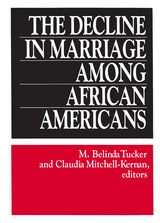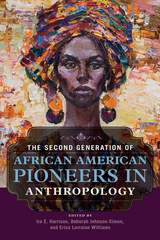2 books about Mitchell-Kernan, Claudia

The Decline in Marriage Among African Americans
Causes, Consequences, and Policy Implications
M. Belinda Tucker
Russell Sage Foundation, 1995
In a time when the American family has undergone dramatic evolution, change among African Americans has been particularly rapid and acute. African Americans now marry later than any other major ethnic group, and while in earlier decades nearly 95 percent of black women eventually married, today 30 percent are expected to remain single. The black divorcee rate has increased nearly five-fold over the last thirty years, and is double the rate of the general population. The result, according to The Decline in Marriage Among African Americans, is a greater share of family responsibilities being borne by women, an increased vulnerability to poverty and violence, and an erosion of community ties. The original, often controversial, research presented in this book links marital decline to a pivotal drop in the pool of marriageable black males. Increased joblessness has robbed many black men of their economic viability, rendering them not only less desirable as mates, but also less inclined to take on the responsibility of marriage. Higher death rates resulting from disease, poor health care, and violent crime, as well as evergrowing incarceration rates, have further depleted the male population. Editors M. Belinda Tucker and Claudia Mitchell-Kernan and the contributors take a hard look at the effects of chronic economic instability and cultural attitudes toward the male role as family provider. Their cogent historical analyses suggest that the influence of external circumstances over marriage preferences stems in large part from the profoundly damaging experience of slavery. This book firmly positions declining marriage within an ominous cycle of economic and social erosion. The authors propose policies for relieving the problems associated the changing marital behavior, focusing on support for single parent families, public education, and increased employment for African American men.
[more]

The Second Generation of African American Pioneers in Anthropology
Ira E. Harrison, Deborah Johnson-Simon, Erica Lorraine Williams
University of Illinois Press, 2018
After the pioneers, the second generation of African American anthropologists trained in the late 1950s and 1960s. Expected to study their own or similar cultures, these scholars often focused on the African diaspora but in some cases they also ranged further afield both geographically and intellectually. Yet their work remains largely unknown to colleagues and students. This volume collects intellectual biographies of fifteen accomplished African American anthropologists of the era. The authors explore the scholars' diverse backgrounds and interests and look at their groundbreaking methodologies, ethnographies, and theories. They also place their subjects within their tumultuous times, when antiracism and anticolonialism transformed the field and the emergence of ideas around racial vindication brought forth new worldviews. Scholars profiled: George Clement Bond, Johnnetta B. Cole, James Lowell Gibbs Jr., Vera Mae Green, John Langston Gwaltney, Ira E. Harrison, Delmos Jones, Diane K. Lewis, Claudia Mitchell-Kernan, Oliver Osborne, Anselme Remy, William Alfred Shack, Audrey Smedley, Niara Sudarkasa, and Charles Preston Warren II
[more]
READERS
Browse our collection.
PUBLISHERS
See BiblioVault's publisher services.
STUDENT SERVICES
Files for college accessibility offices.
UChicago Accessibility Resources
home | accessibility | search | about | contact us
BiblioVault ® 2001 - 2024
The University of Chicago Press









